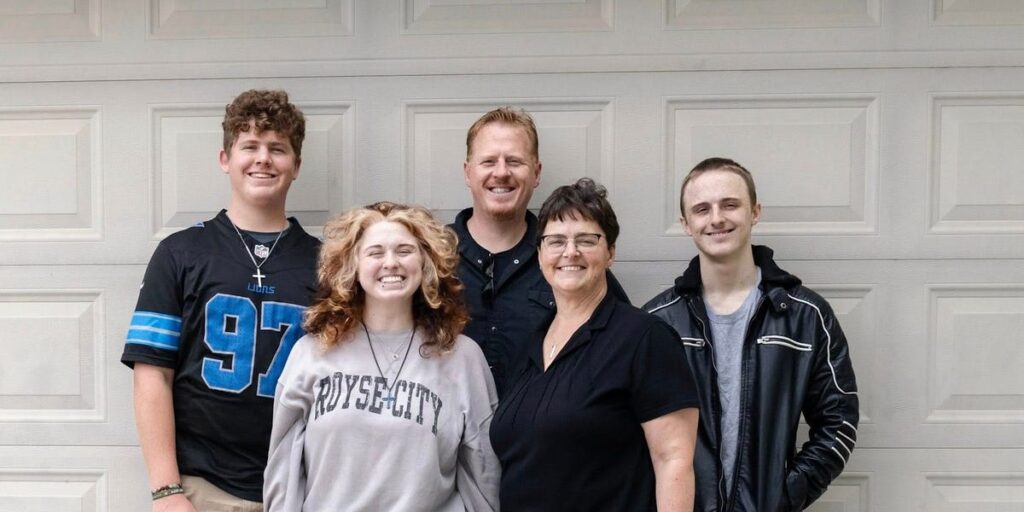At 20 years old, I married a man I met in kindergarten. Together, we checked off all the supposed-to-dos that defined success in our generation. We got our college degrees, started our careers, paid off our college debt, bought our first home, and then had kids.
Those kids — a daughter, 21, and two sons, 19 and 17 — are all still at home. At first glance, this might seem like something went wrong. Shouldn’t our kids be “grown and flown“? But a quick look behind the curtain reveals how this is working well for all of us.
I stayed home with them when they were young
I always knew I wanted to stay at home with my kids, like my mother and her mother before her. I longed to be there for my kids’ ups and downs and to be their biggest cheerleader. But I also didn’t want to set my career aside for two decades.
My solution: working from home. Throughout my kids’ childhood, I was able to maintain my sense of self through constant writing, querying, pitching, and publishing.
The curveball came when my oldest was diagnosed with dyslexia, and her school and I agreed that homeschool was a better option for her. I pursued dyslexia training, and we hit the ground running.
Within a year, we found a rhythm, and I asked the boys if they, too, would like to try homeschooling. It was a choice we never regretted.
But still, I assumed life would change after they graduated from high school. I assumed they’d be sick of their parents’ rules and want to leave the nest.
I was wrong… kind of.
None of them has decided to go to a traditional four-year university, though we would have supported that decision if they had. And no, none of them has moved out of our house yet.
My kids have taken non-traditional paths
As my husband and I looked around at our peers, we realized how lucky we were that the traditional script for life had worked for us. Many of our friends seemed stuck, weighed down by unfulfilling careers and relationships and hefty financial burdens. It wasn’t anyone’s fault; they had followed the same script we were handed, only to find something was still missing.
That realization encouraged us to create a broader definition of success for our kids: health, wisdom, and happiness.
By opening up what success could mean, each of our kids also started defining it for themselves. They grew into young adults who were not only capable but deeply connected to who they were and what they really wanted.
Our daughter is a photographer and globetrotter whose dreams have taken her from being at Ground Zero during the Turkey earthquake in February 2023 to being featured in magazines that showcase her art.
My older son always advocates for the underdog, which landed him a team lead position at a fast-food restaurant within months of starting. He is now concentrating on which trade he wants to pursue long-term, so he and his girlfriend can start their lives together.
My youngest son is service-minded and fearless. He is an entrepreneur who ran three different businesses before finishing high school. He serves as a singer, teacher, and handyman at church while training for a team lead position at a fast-food restaurant.
Rather than focusing on obtaining money and things, they are focused on health, wisdom, and happiness.
I used to wonder if I’d failed them
Over the years, as I’ve watched my friends post pictures of their kids graduating from universities, getting married, and having babies, I wondered if I failed my kids somehow. Would the traditional script have made their life easier? Better?
But then I look at my kids with their significant others and friends, and I’m overwhelmed with gratitude. The economic reality is that even with four or more years of college, many young adults can’t land jobs that cover their bills (much less pay off their degrees). Why not lean into the multi-generational living situation that many cultures around the world thrive in?
They do want to move out eventually, but there’s no rush
Each of my kids wants to leave the nest and build their own lives eventually, but we’ve mutually agreed that, for now, staying at home and shifting our relationship from parent-child to co-inhabitants is the best way to set them up for success. The idea is simple: save your money and chase your dreams, while contributing to the family unit.
They’re young adults, figuring out who they are and who they want to become, with the benefit of doing it without the weight of a mortgage or student debt.
Together, we are happy, healthy, wise, and debt-free. That sounds like success to me.
Read the full article here


